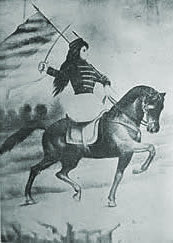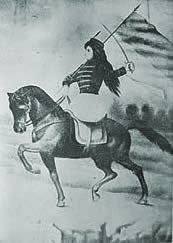
|
Women and Independence in Latin America An exploration of women's involvement in the Latin American Wars of Independence |

|

|
Women and Independence in Latin America An exploration of women's involvement in the Latin American Wars of Independence |

|
Click on the image below to see the full-size image
 Tertulia |
Gender:Female
Ethnic origen: White
Events:
| 1787 | - | Chillán | - | Not applicable | - | Born |
| 1813 | - | Chillán | - | Unknown | - | She and her mother were kept hostage in Chillán in November 1813. |
| 1814 | - | Buenos Aires | - | Unknown | - | She went to live in Buenos Aires with her brother and mother. |
| 1815 | - | Mendoza | - | Unknown | - | She moved to Mendoza in 1815. |
| 1822 | - | Los Angeles | - | Unknown | - | She was living here in August 1822. |
| 1822 | - | Los Angeles | - | Unknown | - | She wrote to her brother on 15 August 1822. |
| 1823 | - | Lima | - | Unknown | - | She and her mother accompanied O'Higgins in his exile here. |
| 1823 | - | Santiago de Chile | - | Unknown | - | She was living here in March 1823. |
| 1823 | - | Santiago de Chile | - | Unknown | - | She wrote to Bernardo O'Higgins on 2 March 1823 about his abdication. |
| 1850 | - | Lima | - | Unknown | - | Died |
Connections:
Chilean exiles (Buenos Aires)Texts:
1822 - Letter to her brother, Bernardo O´Higgins, regarding political matters.
1823 - Letter to Bernado O´Higgins about his abdication.
Biography:
Born in 1787, the step-sister of Bernardo O'Higgins, and Nieves Puga y Riquelme. She died in 1850. (Knaster, 15)
She wrote to Bernardo O'Higgins in August 1822 from Los Angeles, Chile, about political matters and in March 1823 from Santiago de Chile about his abdication. (Vergara Quiroz, 122-123, 138-139)
She freed a slave that she had inherited from her brother, Bernardo O'Higgins. (Blanchard, 161)
She and her mother accompanied O'Higgins to Buenos Aires, around 1814 as they feared he would take revenge on the Carreras for Mackenna's death. They made a living by sewing, making cigarettes, and selling food. And in 1815 they all moved to Mendoza. (Clissold, 137, 139)
She and her mother were sent to Chillán as hostages in October 1813. (Clissold, 108)
She looked after her brother's house in Santiago and hosted musical tertulias there. She is described as short, plain and stocky, with a "brusque" manner that gave her the nickname "the general in petticoats". Mary Graham visited them. (199-202)
She accompanied her mother and brother into his exile in Lima. (Clissold, 225-226)
References:
Blanchard, Peter (1992) Slavery and Abolition in Peru
Clissold, Stephen (1968) Bernardo O'Higgins and the Independence of Chile
Knaster, Meri (1977) Women in Spanish America: An Annotated Bibliography from Pre-Conquest to Contemporary Times
Vergara Quiroz, Sergio (1987) Cartas de mujeres en Chile, 1630-1885